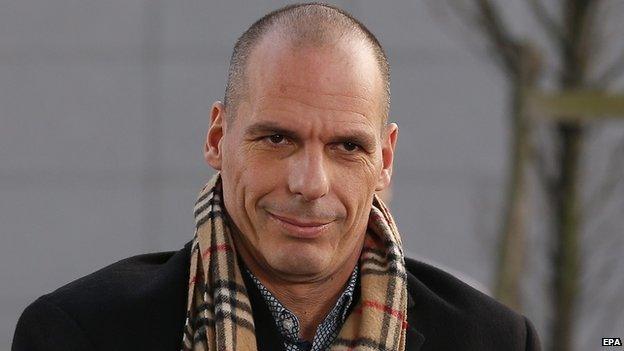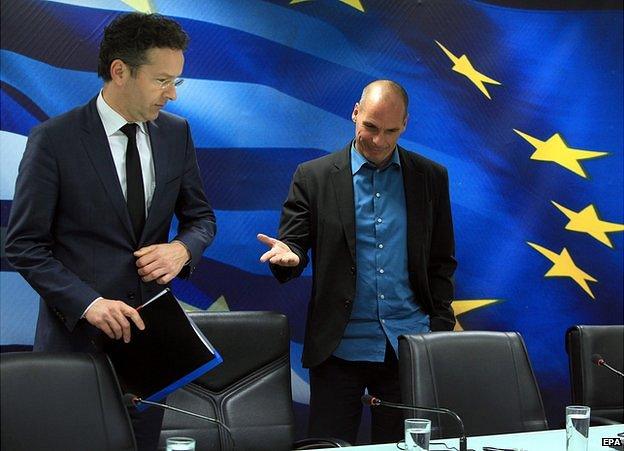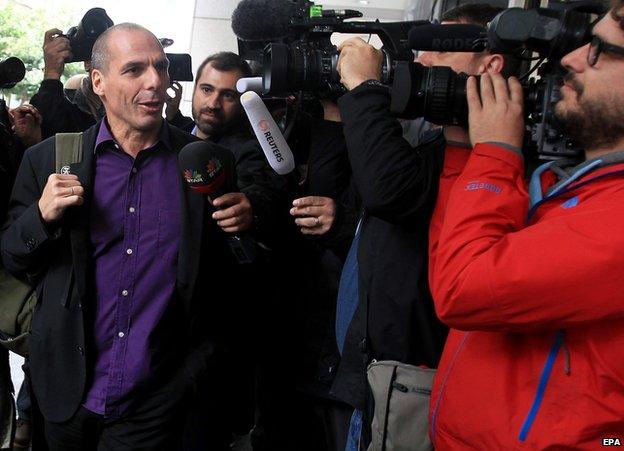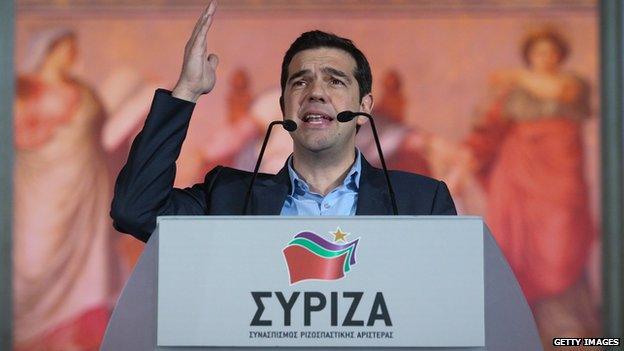Profile: Yanis Varoufakis, Greek bailout foe
- Published

The resignation of Greece's left-wing Finance Minister Yanis Varoufakis will come as a surprise to many voters following his party's overwhelming success in Sunday's bailout referendum.
The 54-year-old played a key role in convincing the nation to vote 'No', so he could persuade its creditors to end austerity and forgive part of its debt.
Described as a charismatic man and well-respected political economist, he became something of a global celebrity following his appointment to government.
But it seems his eurozone colleagues failed to find him so charming.
Writing on his website on Monday, Mr Varoufakis said he had been "made aware of a certain preference by some eurogroup participants, and assorted 'partners', for my… 'absence' from its meetings".
He repeatedly clashed with creditors during recent negotiations - and obviously feels his resignation will help Prime Minister Alexis Tsipras reach a much needed deal with lenders in Brussels.
'Varoufitses'
Mr Varoufakis's departure will undoubtedly sadden those who voted him to power. He got more votes than any other candidate in the 25 January general election that swept the leftist Syriza party into government.
In the wake of victory he immediately embarked on a European tour that took him to London, Paris, Rome and Berlin.
The sight of a shaven-headed, athletic minister refusing to tuck his shirt into his trousers or wear a tie - even while visiting 11 Downing Street - fascinated business reporters, fashion editors and gossip columnists.
Even the German media - among Greece's sternest critics - seemed impressed. ZDF television anchor Marietta Slomka said "he is someone you could imagine starring in a film like Die Hard 6", and conservative daily Die Welt ran the headline, external "What makes Yanis Varoufakis a sex icon".
In his home country, a new word was coined - "Varoufitses" - to describe women who idolise Mr Varoufakis.
At the time of writing, Mr Varoufakis had 528,000 Twitter followers, a number of devoted fan pages on Facebook, and he has inspired a video game "Syrizaman Vs Troika", external.
His eurozone colleagues, however, were not among his fans. In his first meeting with them on 11 February he refused to approve a common statement by the Eurogroup that implied Athens would seek an extension of its bailout.
"Simple logic dictates that if you cannot even conceive the possibility of leaving a negotiation, then it is preferable never to enter one," he wrote in a blog, external entry back in May 2010.

Eurogroup chief Jeroen Dijsselbloem (left) and Yanis Varoufakis had a frosty encounter soon after Syriza's triumph

In Paris Mr Varoufakis sported an eye-catching leather jacket for his finance ministry talks

Varoufakis soundbites
Greek bailout is like "fiscal waterboarding"
The euro is like Hotel California in the Eagles song - a place where "you can check out any time you like but you can never leave"
Varoufakis is "the George Clooney of the government", said Nikitas Kaklamanis, a centre-right New Democracy politician
"So let us default! Now! With a smile and optimism!" - Varoufakis in April 2010
"Europe in its infinite wisdom decided to deal with this bankruptcy by loading the largest loan in human history on the weakest of shoulders - the Greek taxpayer"

Always defiant
Mr Varoufakis showed signs of defiance and non-conformism from a very early age. That includes deliberately misspelling his name Yanis, writing it with only one "n" since elementary school. "I had an aesthetic problem with the double "n"," he said. "So I decided to write my name with one. My teacher gave me a bad grade, which made me very angry and I've kept writing my name with one "n" ever since."
Mr Varoufakis was born on 24 March 1961 in Athens. He is a graduate of the Moraitis private school, which has nurtured many members of Greece's political and economic elite.
His father, 89-year-old Giorgos Varoufakis, is chairman of Halyvourgiki, a Greek industrial giant.
This background of relative privilege did not prevent Mr Varoufakis from becoming a libertarian Marxist, who has said that "Karl Marx was responsible for framing my perspective of the world we live in, from my childhood to this day".
After receiving his doctorate from the University of Essex he spent a couple of years teaching there and at the University of East Anglia. But Margaret Thatcher's third election victory in 1987 proved too much to bear for Mr Varoufakis, who started to "plan his escape" from Britain.
His escape destination was not Greece, but Australia, where he taught economics at the University of Sydney.
He finally returned to Athens in 2000, a decision he attributed to a combination of nostalgia and, again, an "abhorrence of the conservative turn of the land Down Under".
In 2005 his ex-wife and young daughter Xenia moved permanently to Australia, leaving Mr Varoufakis "in a state of shock". Shortly after, he met his second wife Danae Stratou, who he says saved him from "oblivion" and he has been with her every step of the way since.

Yanis Varoufakis's casual look sets him apart from suit-and-tie EU colleagues
Modern Cassandra
Mr Varoufakis burst onto the Greek political scene in 2010, when Athens pleaded for a bailout from its European partners and the IMF.
Here was a rare mainstream economist condemning the bailout, warning of impending destruction and urging the government to opt for a default. Most other economists, and most Greek mainstream media, followed the official line: Greece would soon be back to growth and the markets.
Mr Varoufakis was happy to play the role of Cassandra, the Trojan princess of Greek mythology with the gift of prophecy, cursed by Apollo to be disbelieved.
"We can stand the pain. The problem is that the troika is suggesting a 'therapy' which, as far as I know, is not just painful but worse than the 'disease'," he wrote in an early blog post.
"In ten years everyone, not just us, but the entire Europe, will say this 'therapy' was a Big Mistake."
His blog entries, articles and numerous interviews popularised his views. He had a gift of explaining arcane economic terms in layman's language.
Marxist in Texas
In 2012 Mr Varoufakis left Greece for the United States to teach at the Lyndon B. Johnson School of Public Affairs, at the University of Texas at Austin. Mr Varoufakis has said his decision was partly dictated by death threats received for talking about the scandals of Greek banks, and partly by financial concerns, as he was on a modest university salary in Greece.
In Texas, he won the hearts of the faculty and students alike.
"Yanis is where he is now because he got it right from the start," said close friend and fellow University of Texas professor James Galbraith, who advised Greece in its last-ditch talks with creditors.
Prof Galbraith described him as both a brilliant academic and popular teacher at Austin.
"He is an excellent, published academic, with years of research and innovative ideas."
He added that the last star economist he can remember was his own father, celebrated Harvard economist John Kenneth Galbraith.

Alexis Tsipras stormed to victory with Syriza on 25 January
'Moral duty'
Mr Varoufakis had said he would "never, never, never" leave academia for politics. So what made him change his mind?
People close to him told the BBC he felt he had a "moral responsibility" to accept the invitation of Prime Minister Alexis Tsipras.
They also described him as a workaholic and ideologue, convinced of the failure of austerity politics. He is said to sleep very few hours at night.
Experts warned not to expect an about-face under pressure from lenders. They said he would sooner leave politics than betray his beliefs.
Some critics said he had the luxury of being defiant, having joint Australian-Greek citizenship and the chance to return to academia whenever he likes.
Whether or not he will choose to go back down that path remains to be seen. However, one thing is certain - Mr Varoufakis remains proud of his work in Europe.
On Monday he wrote: "I shall wear the creditors' loathing with pride."